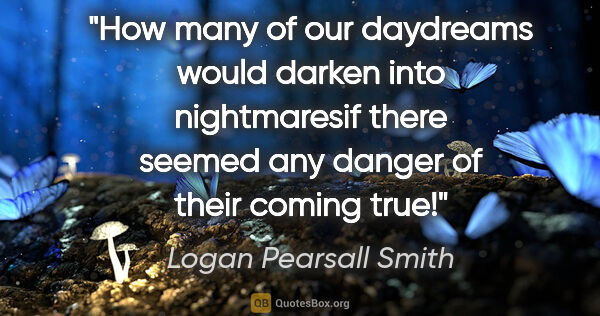Seemingly Quotes (page 59)
His conviction of having no purpose in life other than to act as a distillation of poison was part of the ego of an eighteen-year-old. He had resolved that his beautiful white hands would never be soiled or calloused. He wanted to be like a pennant, dependent on each gusting wind. The only thing that seemed valid to him was to live for the emotions--gratuitous and unstable, dying only to quicken again, dwindling and flaring without direction or purpose.
Yukio Mishima

Let thethings be illusions or not, after all I would then also be an illusion, and thus they are always like me. This is what makes them so dear andworthy of veneration for me: they are like me. Therefore, I can lovethem. And this is now a teaching you will laugh about: love, oh. Govinda, seems to me to be the most important thing of all. Tothoroughly understand the world, to explain it, to despise it, may bethe thing great thinkers do. But I'm only interested in being able tolove the...
Herman Hesse

Now, though, that meadow scene is the first thing that comes back to me. [...] And yet, as clear as the scene may be, no one is in it. No one. Naoko is not there, and neither am I. Where could we have disappeared to? How could such a thing have happened? Everything that seemed so important back then - Naoko, and the self I was then and the world I had then: where could they have all gone? It's true, I can't even bring back her face - not straight away, at least. All I'm left holding...
Haruki Murakami
I am beginning to suspect all elaborate & special systems of education. They seem to me to be built upon the suposition that every child is an idiot who must be taught to think. Whereas, if the child is left to himself, he will think more and better, if less showily. Let him come and go freely, let him touch real things and combine his impressions for himself...
Helen Keller
The Lottery, with its weekly pay-out of enormous prizes, was the one public event to which the proles paid serious attention. It was probable that there were millions of proles for whom the Lottery was the principal if not the only reason for remaining alive. It was their delight, their folly, their anodyne, their intellectual stimulant. Where the Lottery was concerned, even people who could barely read and write seemed capable of intricate calculations and staggering feats of memory.
George Orwell
Days and nights passed over this despair of flesh, but one morning he awoke, looked (with calm now) at the blurred things that lay about him, and felt, inexplicably, the way one might feel upon recognizing a melody or a voice, that all this had happened to him before and that he had faced it with fear but also with joy and hopefulness and curiosity. Then he descended into his memory, which seemed to him endless, and managed to draw up from that vertigo the lost remembrance that gleamed like a...
Jorge Luis Borges
